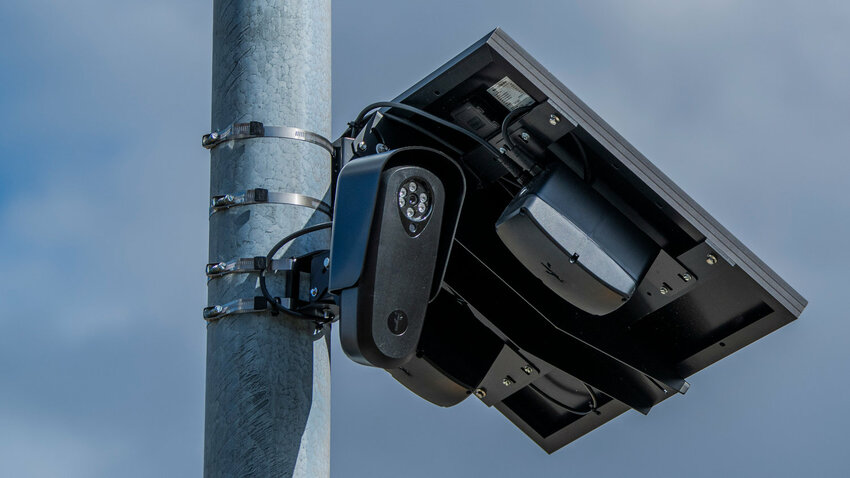
A Flock Safety camera is seen at the corner of West First Street and North Pearl Street in downtown Centralia on Tuesday.
The U.S. Border Patrol accessed data from Flock Safety cameras operated by the Chehalis and Centralia police departments without explicit authorization, according to a report released by the University of Washington Center for Human Rights (UWCHR) on October 21, 2023. This study indicates that these two departments were among at least ten state police agencies that experienced similar unauthorized access from May to August 2023.
The precise method through which the federal agency gained access to this information remains unclear. The UWCHR speculates that it could have been through a national access point or through local departments activating a “National Lookup” feature in their Flock system settings. The report raises significant concerns regarding compliance with Washington’s Keep Washington Working law, which prohibits law enforcement agencies from using local resources for civil immigration enforcement.
The study’s findings stem from records requests filed with 48 state law enforcement agencies. As of the report’s publication, the UWCHR had reviewed records from 35 jurisdictions, revealing that at least eight state law enforcement agencies had enabled direct data sharing with the U.S. Border Patrol. It is reported that at least one agency may have even conducted Flock data searches on behalf of the Border Patrol.
Flock Safety, established in 2017, provides camera systems that capture license plate data, a tool that has become a valuable resource for law enforcement. The information collected is often utilized by Immigration and Customs Enforcement (ICE) to identify potential targets. Each Flock user can filter through the extensive database by vehicle attributes, including plate number and color.
Concerns Over Data Sharing Practices
Local police departments have control over how they manage data sharing through the Flock system. They can decide whether to share their networks with all state law enforcement agencies, on a national level, or restrict access to their county. Alternatively, they can choose not to share data at all. Despite these theoretical protections, concerns persist regarding the actual accessibility of Flock data.
The utility of Flock cameras has been evidenced in various investigations, including the recent arrest of Jeffrey Zizz, who was charged with the murder of Marcia Norman, an 82-year-old woman in Tenino, Washington. Nevertheless, the implications of unauthorized access to sensitive data have prompted scrutiny from local and state agencies, as well as advocacy organizations like the UWCHR.
In response to these concerns, Washington’s Department of Licensing has reportedly taken steps to suspend federal access to its Driver and Plate Search database. The UWCHR’s report highlights a growing controversy over Flock data sharing, noting that several cities have canceled or suspended contracts with Flock Safety, including Austin, Texas; Sedona, Arizona; Syracuse, New York; and Berkeley, California.
“The proliferation of these technologies impacts the rights of all Washingtonians,” the UWCHR report asserts. The organization emphasizes the need for careful management of data sharing with federal agencies, particularly in light of reports of federal immigration enforcement operations in the state.
Local Law Enforcement’s Position
Centralia Police Department Commander David Clary expressed surprise at the revelation of federal access to their network data, stating that it was granted as part of a “pilot program” between Flock and federal law enforcement, which has since concluded. Clary clarified that the only federal agency previously granted access was the Postal Inspector, which was necessary during a spike in thefts in the area.
Clary stated that the Centralia Police Department adheres to state law regarding immigration enforcement, emphasizing their commitment to assist only for public safety and not to aid in ICE operations. He described Flock cameras as a “very powerful tool for solving crimes,” facilitating quick searches that can lead to the apprehension of suspects in critical situations.
“The ability to search for a specific license plate after an incident, such as a shooting, allows us to locate suspects rapidly,” Clary noted. He emphasized that searches within the Flock system are logged and must have legitimate reasons to be conducted.
As of now, the Chehalis Police Department has not responded to requests for comment regarding this issue. For further insights and details, the full report by the UWCHR can be accessed [here](https://jsis.washington.edu/humanrights/2025/10/21/leaving-the-door-wide-open).






